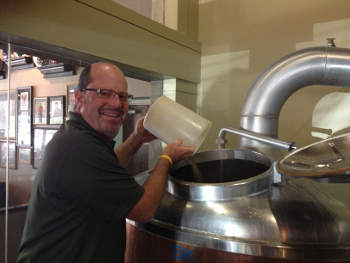 I’m a 6th generation Hayseed from Nebraska, living in Lincoln with my VERY supportive wife Theresa and our two dogs, Nitro, a Jack Russell Terrier and Delilah a Yorkshire Terrier/Poodle mix. I started brewing in December 2010, almost exactly 4 years ago as I write this. I did a handful of extract batches on the stove before getting kicked out of the kitchen into the garage, where I assembled the equipment to do all grain brewing. I’m a proud member of the world famous Lincoln Lagers Homebrew Club. The Lagers are an amazingly knowledgeable group of brewers who freely share both their knowledge and their beer! The benefits of joining a home brew club are huge, especially if you want to learn how to make better beer. We have a lot of BJCP judges in the club and are working on getting a few more certified. I took the tasting exam in August and am currently awaiting my results. We held the inaugural Sowers Cup Homebrew Competition in 2014 and plan on hosting it annually. We had some really great prizes in 2014, should be even better next year. I have a competitive spirit with a background in drag racing as well as land speed racing. I actually held a land speed record at over 232 MPH for about 20 years. Once I got into brewing I was surprised to find out that you could compete with beer. I have entered competitions regularly throughout 2013 and 2014. One of the cool things I like about beer competition is that it’s blind and provides a level playing field for everyone. Unlike racing, spending large amounts of cash on fancy equipment does not really buy any advantage, rather hard work and attention to detail is usually rewarded. In 2014 I brewed and competed with beers from all 28 BJCP style categories. I've been accused of going overboard on things at times. To that I say "anything worth doing is worth overdoing!" I boil in a 15 gallon kettle, use a 10 gallon beverage cooler for mash/lauter and another cooler for HLT. I generally fly sparge but will occasionally do a no sparge or batch sparge, particularly on low gravity beers. The main system upgrade I have added is a second burner, that is really nice to have so I can do two boils at the same time, it also comes in handy for doing decoctions on the German Lagers. I have the burners plumbed to natural gas, which is probably the single best part of my system, no more hauling around propane tanks, plus you never run out of gas! I rely on a combination of gravity and muscles to move the liquid around, it’s great to have the kettle just high enough that it will drain right into fermenter. Speaking of fermenters, I generally prefer buckets since they are light weight, easy to clean and unbreakable. I have a few glass carboys around that mostly get used for sour beers. If I need to bulk age something, I will typically use a keg for that. Since I have 2 burners, I added a second mash/lauter tun so I can do two 10 gallon batches at the same time. If I do a 10 gallon boil it will usually get split with 2 different yeast strains or spices or something different, either that or I will split the boil and make 2 totally different beers. I like brewing this way as it keeps me busy on brew day and makes good use of time. Using this method I can end up with 4 different 5 gallon batches in the fermentation area at the end of an 8 hour brew day. I'd like to thank all the participating competition organizers as well as the Midwest Homebrewer Of The Year organizers for creating such a fun and challenging competition. The winning percentage factor really forces you to carefully consider the beers you enter. Thanks too go to Jason McLaughlin for helping me dial in some of my competition entries and the style knowledge I learned from him. I'd also like to say a special thank you to my fellow competitors, Scot Schaar and Michael Wilcox who pushed me to become a better brewer. Beer is only temporary, however, the friendships I have forged through beer I expect to last a lifetime. |